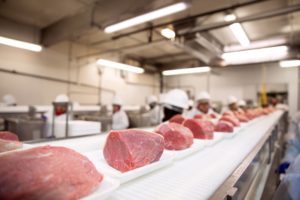 When it comes to lack of diversity, the issue doesn’t just lie in engineering. Despite a slight rise in recent years, women in meat manufacturing are incredibly scarce. The statistics speak for themselves; the national average is a 75:25 male to female ratio. But, with a number of roles to fill, food and drink manufacturers need to know how to attract a diverse workforce.
When it comes to lack of diversity, the issue doesn’t just lie in engineering. Despite a slight rise in recent years, women in meat manufacturing are incredibly scarce. The statistics speak for themselves; the national average is a 75:25 male to female ratio. But, with a number of roles to fill, food and drink manufacturers need to know how to attract a diverse workforce.
Here, we provide the facts that reveal why there is such a shortage, along with steps that can be taken to tackle the problem.
Exclusion
Whilst it has improved in recent years, historically, there have been businesses in the sector that haven’t invited women into roles with open arms. For example, there are more females in meat packing than meat cutting, because there is a belief that women simply don’t have the skill set to perform the required technique.
Blocking females from high-level positions is even more common. And, even those women that do lead their own meat manufacturing SME have reported experiencing preconceived notions.
Lack of role models
Many women argue that they don’t feel welcome in the meat manufacturing industry. This has had a knock-on effect, leading to a male-dominated sector and as such, there are few female role models for others to look up to.
Equally, those females who have already started working in meat manufacturing haven’t got access to support and mentoring. Naturally, this results in them being less likely to stay in the industry.
Shortage solutions
There have been a number of strategies to tackle the issue such as ‘Meat Business Women.’ Established in 2015, the group aims to develop the image, culture and landscape of the industry, making it more appealing to female talent. Members will be supported with effective education and mentoring too. It’s been a success and has since gone global.
Many have said that there is still a lot to be done – and by food manufacturing businesses themselves. For example, the responsibility of reviewing pay equity lies with individual organisations. Like many industries, there is an unfair balance in men’s favour.
Another idea that’s being adopted is creating progression pathways. With a clear route to leadership in place, women are more likely to stay within or be attracted to the sector. Apprenticeships are proving to be a vital solution in not only solving the issue of supply and demand, but also filling any skills gaps.
The skills and labour shortage is felt in many positions – from technical managers to those in quality assurance. And these are just some of the roles that Silven help recruit for. We take away the burden of talent sourcing in difficult markets for meat manufacturers, along with other businesses in food and drink manufacturing.
Our knowledgeable team are able to deliver you with the perfect candidates for your roles, and swiftly. By leveraging technology and a proactive, personalised service, we’re ahead of the curve in meeting your recruitment needs.
To discover more about how we could progress your food business with food manufacturing recruitment, get in touch with our friendly team today.